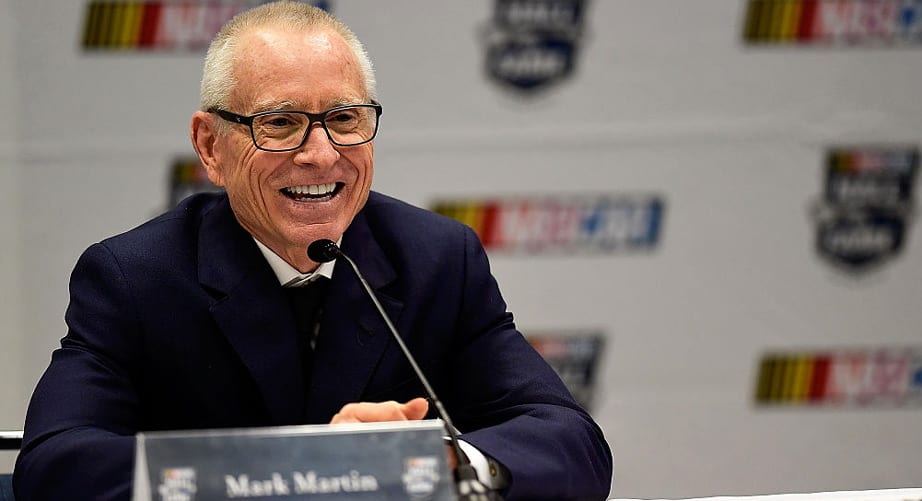
Imago
Via NASCAR

Imago
Via NASCAR
In the early 1980s, a young Mark Martin was already turning heads. At just 22 years old, he was running his own small team and holding his own against NASCAR’s best. In just five races, he had earned two poles, led laps, and finished third at Martinsville. His early numbers were impressive, his drive, even more so. Martin’s work was laying the foundation for what would eventually put Roush Racing into the spotlight. Naturally, people in the garage noticed, and so did the power players. On a quiet day in late 1981, while focused on his late-model program, Mark picked up the phone. What came next would become the biggest “what if” of his career.
Watch What’s Trending Now!
It was late 1981, and Mark Martin was deep in the grind, prepping for a short-track showdown and chasing his dream from a modest garage. Then the phone rang. On the other end was Waddell Wilson, one of NASCAR’s most respected crew chiefs and engine builders. He had an offer: the chance to drive the No. 28 car, a top-tier ride powered by Robert Yates engines. For any young driver, it was the kind of call that could change everything. That same No. 28 car would go on to win the 1983 Daytona 500. But Mark said no. What came next surprised many, and defined the kind of career he would build. One shaped not by shortcuts or instant fame, but by loyalty, grit, and a belief in doing things his own way.
The call of a lifetime for Mark Martin
Martin recently recalled that moment while speaking with Kevin Harvick. “The phone rings on the pole barn… ‘Mark, this is Waddell Wilson. Like to know if you’d be interested in driving the 28 car.” Martin’s reply was direct. “No, Waddell. I think I’d rather do my own deal.” At the time, he believed he was close to winning on his own. “I thought I’d win a race in the next five races. Wouldn’t you have thought so?” He had loyal employees, free cars from Ray Dillon, and engines from Prototype. He could not just walk away. “What was I supposed to do? Say, ‘See you guys. I’m off to the big time? I was too loyal for that.”
After Mark Martin turned down the offer to drive the No. 28 car, the seat eventually went to Cale Yarborough in 1983. The car was strong; Yarborough qualified at over 200 mph, but crashed during qualifying. Remarkably, the team rebuilt a promotional Pontiac LeMans from a Hardee’s restaurant, and Yarborough went on to win the Daytona 500 in it.
Before that, Benny Parsons had driven the No. 28 car in 1982, making 14 starts. His time in the ride was short-lived. According to Mark Martin, Benny was allegedly let go after Talladega in 1982, suggesting the team wasn’t satisfied with his performance. “Benny ran, I think, about seven races and got fired after Talladega,” Martin said. Even now, he wonders what could have been. “Could a 22-year-old Mark Martin have outdrove Benny Parsons? I’m not sure.” If he had taken that call, Martin may have launched into NASCAR stardom. Instead, he stayed. He stuck with his people. He built his name with Jack Roush, one step at a time. In return, he got control, trust, and a legacy of his own making.
“I just was too loyal for that.”- @markmartin shares with @KevinHarvick the story behind his multiple chances to drive the iconic No. 28 for Robert Yates Racing. pic.twitter.com/bvNUnobXis
— HarvickHappyHour (@HarvickHappyPod) July 31, 2025
While others chased glory at the Daytona 500, Mark Martin was grinding in a cold Batesville garage, tuning short-track setups with borrowed tools and makeshift gear. No spotlight, just grit. He wasn’t winning trophies yet; he was building a legacy the hard way.
Mark sides with fans against NASCAR playoffs
Mark Martin has lived through some of NASCAR’s greatest moments. But now, his focus is on what should be. The Hall of Famer is drawing attention again. Not for a race, but for taking a stand. Martin believes NASCAR should end the playoff format and return to the full-season points system.
Speaking on Mark, Mamba & The Mayor and later with Frontstretch, Martin shared his thoughts clearly. He said, “80 percent of fans” want the old system back. “I know for a fact,” he insisted. “I hear it all the time. That’s what fans want.” Martin’s view is that the playoff model introduced in 2004 sacrifices consistency and true performance for manufactured drama.
Martin argued that the playoff system undermines consistency. It makes the championship feel random. “The old system rewarded a great season,” he said. “Now, it just takes one lucky stretch to win it all.” He also pointed out television’s growing influence, especially from networks like NBC. Martin noted, “The TV people decide everything now. Not the racers.” As he shared his thoughts on the matter, Martin also revealed he once considered leaving the NASCAR fan council. He said he stayed only because of people like Larry McReynolds, whom he deeply respects.
For a driver who came agonizingly close to championships under the old system, Mark Martin’s perspective carries unique weight. His rejection of the playoffs is not about personal regret. It is about protecting the integrity of NASCAR for future generations. As the sport juggles evolving TV dynamics and shifting fan bases, Martin’s latest stand is a call to remember what once made it great.








